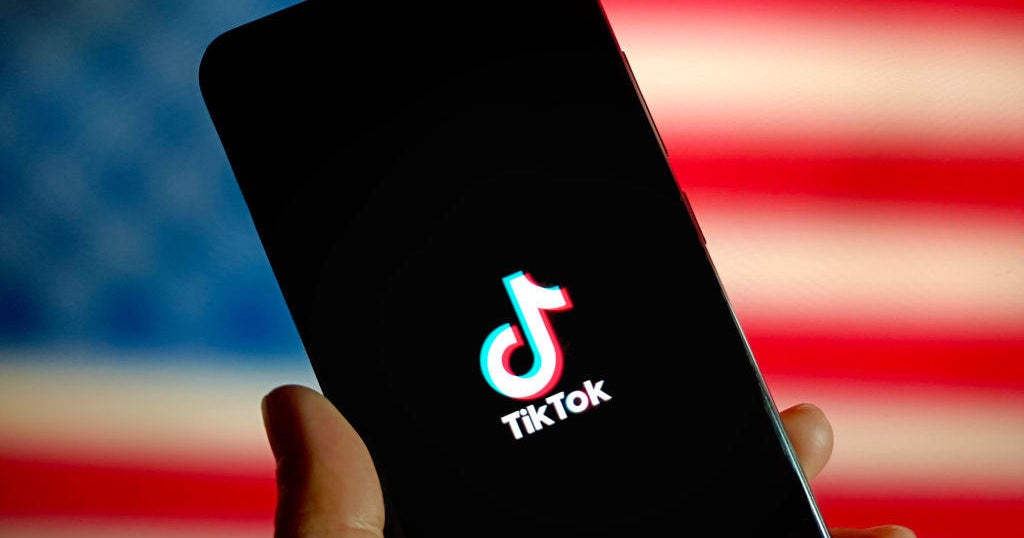
Washington — The House on Wednesday passed legislation that could ban TikTok in the U.S. if its Beijing-based parent company ByteDance doesn’t sell its stake in the massively popular social media platform.
The vote was 352 in favor and 65 opposed, underscoring its broad bipartisan support, with 197 Republicans and 155 Democrats voting to approve it. Fifteen Republicans and 50 Democrats voted against the bill. One Democrat voted “present.”
The House fast-tracked the legislation, known as the Protecting Americans from Foreign Adversary Controlled Applications Act, by bringing it up under a procedure that required the support of two-thirds of members for passage.
The bill now goes to the Senate. President Biden has vowed to sign the legislation, which would require ByteDance to sell TikTok within six months or be banned from U.S. app stores and web-hosting services.
TikTok has repeatedly been targeted by lawmakers seeking to restrict the app over concerns that the Chinese government could force ByteDance to hand over the data of its 170 million American users. Lawmakers say the concern is warranted because Chinese national security laws require organizations to cooperate with intelligence gathering. TikTok has long denied it could be used by the Chinese government to spy on Americans.
“Americans need to ask themselves whether they want to give the Chinese government the ability to control access to their data, whether they want to give the Chinese government the ability to control the information they get through the recommendation algorithm,” FBI Director Christopher Wray told House Intelligence Committee members on Tuesday, adding that the Chinese government could compromise Americans’ devices through the software.
China’s Ministry of Commerce said last year it would “firmly oppose” the forced sale of TikTok. ByteDance did not return a request for comment.
Liu Pengyu, spokesperson for the Chinese Embassy in Washington, accused the U.S. of running a disinformation campaign “for the purpose of bringing down the company.”
The U.S. “has not been able to give hard evidence to prove the so-called threats from TikTok to U.S. national security,” Liu said in a statement, calling on the U.S. to “provide an open, fair, equal and non-discriminatory business environment to companies of all countries operating in the U.S.”
But it’s unclear whether the bill’s passage in the House would mark the beginning of the end for TikTok in the U.S. Previous efforts to ban it nationwide have stalled amid disagreements about how to regulate the platform, free speech concerns and legal challenges.
In recent days, TikTok wielded its massive user base against lawmakers, prompting users to inundate congressional offices with calls from constituents worried that they could lose access to the app. A recent Pew Research Center survey found declining support among U.S. adults for a TikTok ban, even among those who were aware of ByteDance’s connection to China.
There was also the question of whether former President Donald Trump’s opposition to the bill would curtail Republican support for it, just as he helped sink a bipartisan immigration deal earlier this year. Trump reversed his support for a TikTok ban, arguing that doing so would benefit Facebook, though at the same time, he also called TikTok a national security risk. Trump signed an executive order in 2020 that would have effectively barred it from operating in the U.S., but it faced a legal challenge from the company and was ultimately rescinded by the Biden administration.
The House bill is likely to face obstacles in the Senate, where a bipartisan effort last year to restrict TikTok petered out. Senate Majority Leader Chuck Schumer, a New York Democrat, has not yet committed to putting it on the floor. Some senators are hesitant to focus on just one social media platform, saying it violates the First Amendment.
“I still have concerns about naming a specific company in legislation, but it feels like this House bill has momentum,” Sen. Mark Warner of Virginia, the Democratic chairman of the Senate Intelligence Committee, told reporters Monday.
Last week, the House Energy and Commerce Committee unanimously advanced it after officials from the Justice Department and FBI gave members a classified briefing on TikTok. House members received another briefing on Tuesday from national security officials.
The Justice Department advised lawmakers that the legislation would be on more stable legal ground if it gave the government the authority to force ByteDance to divest from TikTok, rather than to impose an outright ban on the app if ByteDance doesn’t sell, according to a memo obtained by CBS News. The White House has also suggested it may not yet withstand legal scrutiny.
Rep. Mike Gallagher, a Wisconsin Republican who introduced the bill, said Tuesday that he thinks the legislation could withstand a legal challenge because the bill provides “no authority to go after any American company, and there’s no authority to go after content.”
“This is regulating conduct, not content,” Rep. Chip Roy, a Texas Republican, said after Tuesday’s classified briefing in defense of the bill.
Rep. Robert Garcia, a California Democrat, said he and other Democrats who opposed the bill would put pressure on their Senate colleagues to “ensure the Senate does not rush on this.”
“I’m more hopeful in the Senate doing the right thing right now than us in the House,” he said Tuesday at a news conference with TikTok creators outside the Capitol.
Gallagher, who leads the House Select Committee on the Chinese Communist Party, said an overwhelming vote in favor would send a message to the Senate.
“I just want a big vote on Wednesday so that the Senate is forced to take it up,” he said.
Jaala Brown, Cristina Corujo, Alan He and Robert Legare contributed reporting.
